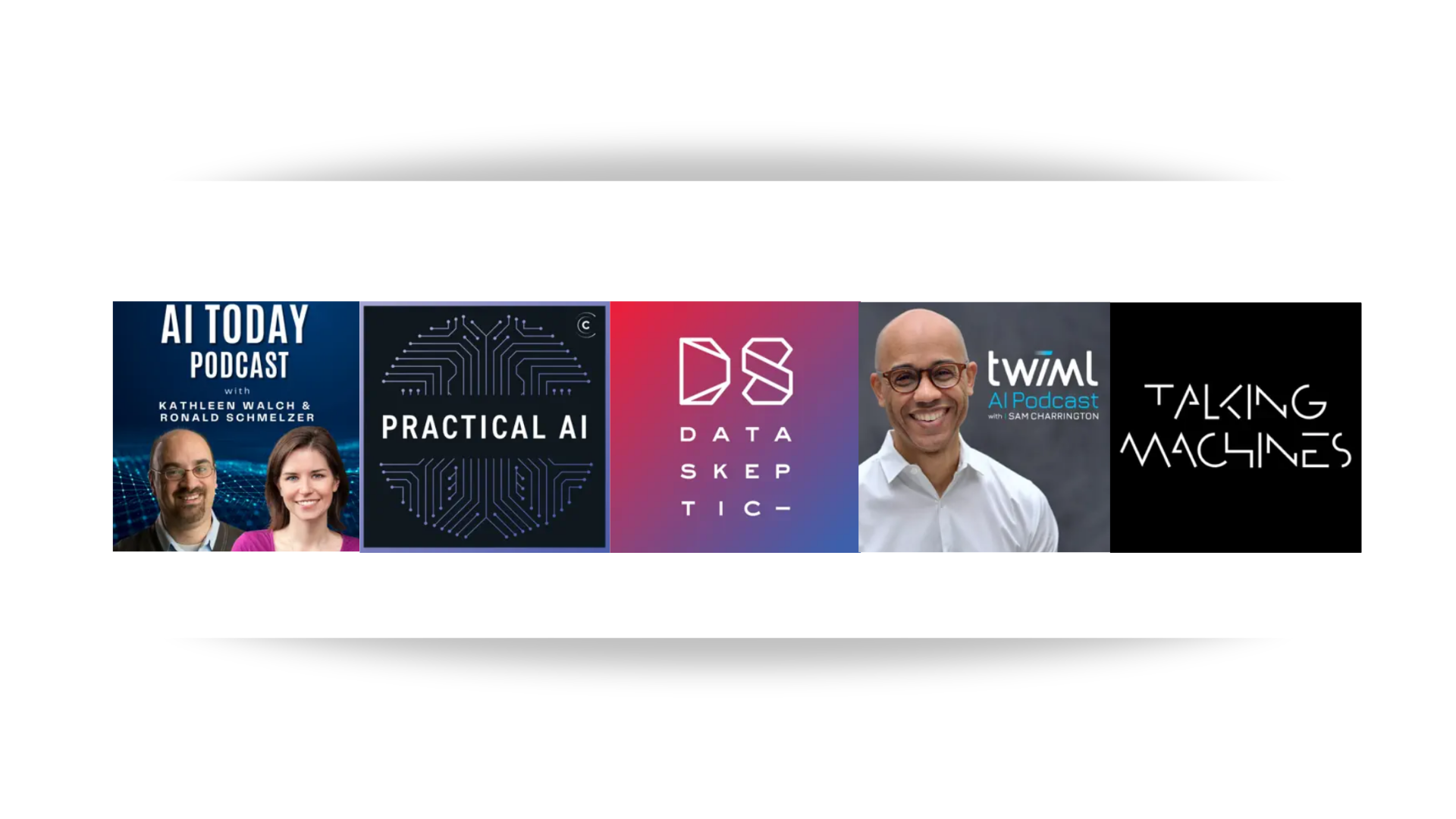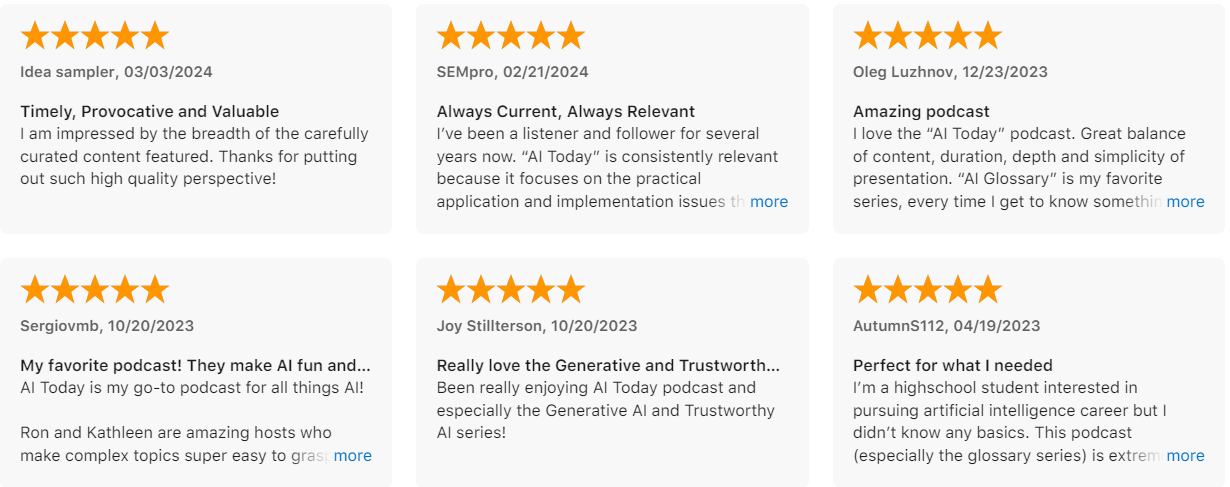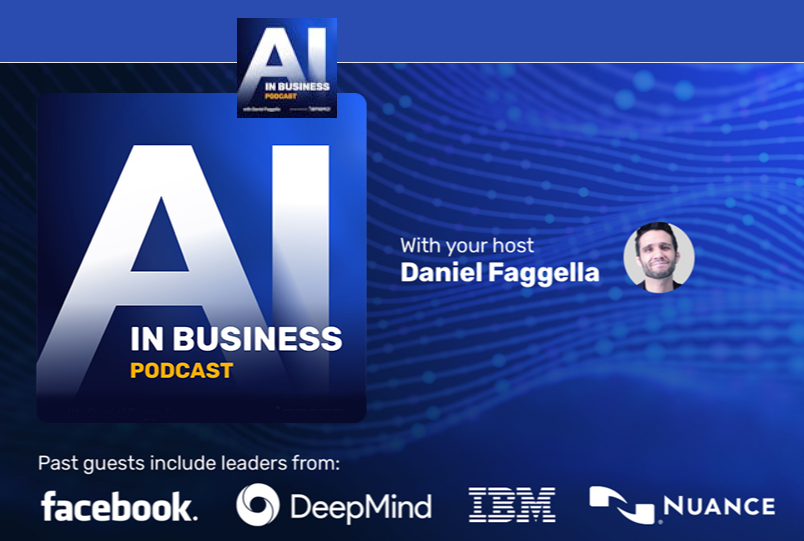Published on: April 25, 2024
AI Podcasts for Beginners: The Ultimate Guide for Non-Techies
Author: Amy Lancelotte

Rewind to your younger self playing with Legos… the thrill as each piece clicked into its place, paving the way to the grand castle of your dreams. The novice you, completely tech-free, is now facing artificial intelligence, the ultimate Lego block of the future, with each click unleashing its potential to create intelligent systems that outperform human intelligence.
Get ready, beginner or not, for unraveling the fascinating world of AI! In the same way that Lego cards guided you to build a dream fortress, this guide will walk you through AI-powered podcasts tailored for non-techies. Packed with essential insights, buzz-free wisdom, and easy-to-follow narratives, these podcasts are set to demystify AI intricacies and draw you into the compelling universe of machine learning, natural language processing, computer science, and so much more.
Discover the best artificial intelligence podcasts for beginners
- Quick exploration and analysis of the top 5 AI podcasts designed for beginners.
- Find out what makes these podcasts suitable for newbie learners.
- Safeguard your learning journey by choosing the right podcast.
Let’s dive right into the world of AI podcasts for beginners but proceed with caution – every podcast is not created the same. Choosing a podcast can be as personal as selecting a novel – the voice, tone, pace and even the length can determine your interest level. But, we have done the hard work for you. Our focus is on selecting a podcast that is ideal for beginners and breaks down complex AI concepts into simple, digestible chunks.
Top 5 AI podcasts for beginners
The jungle of AI podcasts can be intimidating. Here, we’ve hunted down the top 5 for beginners, each worthy of your headphones.

Practical AI Podcast
As the name suggests, Practical AI focuses on making artificial intelligence practical and easily understandable by all with hands-on advice, which can be more engaging and immediately useful for beginners compared to more theoretical content.The podcast is designed to make AI concepts accessible to a broader audience, not just those with a deep technical background. This includes explaining complex topics in simpler terms and discussing the real-world applications of AI. The podcast covers a range of foundational topics and the latest advancements in AI, making it a valuable resource for newcomers who want to get up to speed with the field. The podcast is run by Chris Benson, a Chief AI Strategist, and Daniel Whitenack, a Data Scientist, both of whom bring a wealth of knowledge and an ability to break down complex subjects for all levels of listeners.
Data Skeptic Podcast
This one is quite suitable for beginners, especially those interested in learning about data science and artificial intelligence from a critical perspective. The podcast breaks down complex AI and data science concepts into more digestible discussions, making it accessible to listeners without a technical background.
Its unique skeptical approach encourages listeners to question and understand the ‘why’ and ‘how’ behind data science techniques, which is beneficial for foundational learning. It covers a wide range of topics, from basic statistics and machine learning to broader issues like AI ethics, providing a comprehensive introduction to the field.
The podcast is run by Kyle Polich, who comes from a data science background. His approachable style and ability to explain technical subjects in layman’s terms make the podcast particularly newbie-friendly.
TWIML AI Podcast
This podcast, which stands for This Week in Machine Learning & AI, can be quite informative for beginners. But, it’s generally best suited for those who have at least some foundational knowledge in AI or a related field. The podcast may occasionally be challenging for complete beginners due to its in-depth technical discussions and coverage of advanced topics in machine learning and AI. However, motivated beginners with a strong interest in AI will find the podcast enriching as it provides exposure to the latest research and applications in the field.
Episodes feature conversations with experts in AI and machine learning research and practice, offering insights into the cutting-edge of technology. This artificial intelligence podcast hosted by Sam Charrington covers a good array of topics from technical details to ethical considerations and practical applications of AI, providing a broad perspective on the field.
For those new to the field, it serves as a good resource to hear directly from leading thinkers and practitioners, which can accelerate learning and understanding of complex concepts.
Here’s what business leader Dhari Alabdulhadi, CTO and Founder of Ubuy Kuwait thinks of this AI-based podcast:
My favorite AI podcast for beginners is The TWIML AI Podcast. Formerly known as This Week in Machine Learning & Artificial Intelligence, it features discussions with industrial and academic leaders in this industry. You get an idea of the various developments in this field and their numerous applications.
I’ve learned hundreds of things through this podcast, ChatGPT’s capabilities being one of them, along with the probable path AI will take. From probabilistic models to symbolic expressions, this podcast simplifies everything within 30-60 minute episodes.

Talking Machines Podcast
This is another great resource for beginners interested in machine learning and AI, thanks to its clear explanations of complex concepts and its accessibility to those without a deep technical background. it often starts with fundamental concepts before moving into more advanced topics, making it easier for new learners to follow along.
Hosts (which do vary) typically break down technical jargon and complex ideas into simpler, more digestible content. The podcast aims to educate its audience, making it a valuable learning tool for those new to machine learning and AI.
AI Today Podcast
Run by Kathleen Walch and Ron Schmelzer, both of whom are managing partners at Cognilytica, a company focused on AI research and advisory services, the AI Today Podcast is very suitable for beginners who are interested in understanding how artificial intelligence is applied in the real world.
The podcast is highly accessible to beginners due to its focus on real-world applications rather than deep technical details. It explores how AI technologies are being integrated and utilized across different sectors, making it easy for newcomers to grasp the practical impacts of AI. The hosts discuss AI applications in various industries, providing listeners with practical examples of how AI is used today. This helps demystify AI for those who may not have a technical background.
The podcast aims to make the content understandable and relatable, which is ideal for beginners looking to get a straightforward explanation of AI concepts without getting bogged down by complex algorithms or code. Plus, each episode features interviews with industry experts, which adds valuable perspectives.

These are great places to dip toes into the vast ocean of AI. But, why are these the chosen ones? We’re thrilled you asked.
What makes these podcasts ideal for beginners?
While there are several aspects culminating in a great learning experience, key elements like accessibility of language, duration, pace of information, and relevance of topics make these podcasts suitable for beginners.
Accessibility of language
The AI Today and Data Skeptic podcasts are specifically known for using more simplified language that is comprehensible and can hold the interest of beginners.
Duration
On average, the podcasts we recommend for beginners are around the 45-minute mark, but there are fluctuations within each one. If you’re short on time, AI Today consistently offers the shortest podcast episodes, with some even under 10 minutes. Here’s a breakdown of the average episode run times for each of our top 5 beginner-friendly podcasts:
- Practical AI: 35 to 45 minutes
- Data Skeptic: 35 to 45 minutes
- TWIML AI: 45 to 50 minutes
- Talking Machines: 25 to 40 minutes
- AI Today: 25 to 30 minutes
Pace of information
Although it will depend on how the expert guests engage with the host and the specific topic, generally all of the podcasts we’ve already suggested offer a manageable pace of information for beginners. With more tech-focused episodes from TWIML and Talking Machines, consider making notes to make sure you don’t miss out on anything and you can conduct further research later if needed.
Relevance of topics
Whether you’re interested in taking on generative AI, machine learning, critical thinking and AI, or looking for practical examples of AI uses, there’s a podcast out there for you. Not every episode will appeal to beginners, so read the summaries and use targeted searches to ensure you find something engaging and informative. Believe us – it exists!
Finding a podcast you connect with can be pivotal to your learning experience. So test the waters with our picks, and shake hands with the AI world comfortably. Remember, it’s only scratching the surface of what’s out there.
Understanding AI through podcasts: A deep dive
- Podcasts break down complex AI concepts into understandable terms.
- They allow for ongoing learning, especially for busy professionals.
- Understanding AI becomes a part of daily routine rather than a chore.
How podcasts simplify complex AI concepts
Podcasts are powerful tools when it comes to demystifying complex concepts like artificial intelligence. They present information in a conversational and relatable way that can make even the most intricate of topics digestible. It’s akin to having a conversation with a knowledgeable friend who is an expert on the subject.
Furthermore, the audio nature of podcasts allows listeners to multitask, making them an excellent option for busy professionals who are keen to gauge an understanding of AI in their spare time. The intricate details of AI, such as machine learning algorithms, neural networks, and deep learning models, often appear intimidating in written form. But, when they are explained verbally in a podcast, the terms and concepts seem less daunting and easier to comprehend.
This convenience and simplicity provided by podcasts help in absorbing the heavy information and new concepts without draining the listeners’ attention.
The role of podcasts in continuous learning
In this era of rapid technological advancement, continuous learning is imperative. Podcasts serve as a great way to ensure continuous learning, particularly in a field as dynamic as AI. The ease of access to podcasts, combined with the adaptability they offer in terms of time and place, encourages a habit of consistent learning.

Studies show that people are more likely to remember information received auditorily. Hence, podcasts can significantly contribute to knowledge retention, which is crucial when dealing with a complex field like AI. Regularly scheduled AI podcasts can turn learning into a habitual activity, aligning with daily routines instead of being an additional task.
Moreover, the diverse range of topics covered in AI podcasts allows listeners to broaden their knowledge horizons without feeling overwhelmed. Whether it’s about the latest AI technologies, ethical concerns, AI in business, or anything else within the AI sphere, podcasts cover it all.
These factors combined turn podcasts into an indispensable tool for continuous learning and understanding of AI.
Therefore, using podcasts as a learning tool can effectively simplify complex AI concepts and promote continuous learning. As you incorporate these AI podcasts into your routine, the intimidating world of artificial intelligence can become part of your casual dinner conversations.
AI podcasts for non-techies: Making AI accessible to all
- Exploring drivers behind the non-techies interest in AI podcasts.
- A curated list of top AI podcasts best suited for those from non-tech backgrounds.
Why non-techies should listen to AI podcasts
With AI playing an increasingly pronounced role in our lives and workplaces, understanding its principles and mechanisms has become a must, regardless of your field. Listening to AI podcasts can help bridge the gap between technical and non-technical professionals, and it’s not just for coders or IT professionals. For non-techies, these podcasts can offer:
- An accessible way to get familiarised with AI concepts.
- Improved ability to leverage AI tools in their job roles.
- Stay up-to-date with AI developments.
AI podcasts translate complicated technical jargon into layman’s terms, making the subject matter more approachable to non-techies. They can dispel common myths about AI and help bust popular misconceptions about the technology, making it less intimidating. These benefits are transforming AI learning, making it a digitally empowering tool everyone can utilize, despite their tech-proficiency levels.
They can also provide useful AI applications in different industries, enhancing one’s knowledge of how AI tools can be used in their respective roles. As AI keeps advancing, these podcasts can be a valuable tool to stay informed about the latest trends, new tools, and innovative applications.
Top AI podcasts for non-techies
Let’s delve into some go-to podcasts designed to help beginners and non-tech leaders navigate the AI realm.
- AI in Business: AI in Business is a fantastic podcast for getting insights into real-world applications of AI. It talks about how AI is deployed in businesses and helps those unfamiliar with AI to become conversant with its application in enterprises. Quoting Lucas Ochoa, Founder and CEO of Automat, “This podcast is my top pick, and I strongly recommend it, especially for AI entrepreneurs, investors, or anyone looking to discover new applications and trends in AI.”

- Artificial Intelligence: AI Podcast by Lex Fridman: This podcast takes a more philosophical view of AI. It covers AI’s societal impacts and delves deep into the moral and ethical aspects surrounding AI.One expert, Precious Abacan, Marketing Director at Softlist had this to say about it:My favorite podcast for beginners in AI is Artificial Intelligence by Lex Fridman.The Artificial Intelligence Podcast (AI Podcast) is a series of discussions focused on technology, science, and the human aspects, hosted by Lex Fridman. Lex is a renowned MIT professor researching human-centered AI, deep learning, autonomous vehicles, and robotics. In each episode, which lasts about an hour, you get to hear conversations with top figures in deep learning like Elon Musk, Jack Dorsey, and others.For me, the standout episode was with Sam Altman. It was an extremely insightful conversation that really enhanced my understanding of current developments in AI. However, it’s important to note that this episode didn’t feature a skeptic’s viewpoint. Honestly, the discussions with Joscha Bach and Sam Altman were transformative for me, changing my perspective and life in relation to AI.I recommend this podcast to everyone interested in AI.
- The AI Podcast: Overall, the AI Podcast by NVIDIA is a great resource for beginners because it demystifies complex AI concepts, provides access to expert knowledge, and showcases the practical impacts of AI technology, all in an easily digestible format.
- The AI Alignment Podcast: Presented by the Future of Life Institute, this podcast explores in-depth critical issues about AI’s long-term future, presenting a blend of tech and philosophy.

By understanding the differing perspectives and approaches that these podcasts use to frame AI, beginners can better equip themselves to engage in thoughtful discussions about AI. Now that we have a grasp of why AI podcasts are helpful and where we can find them, it’s time to make the most of them in our learning journey.
Learning AI via podcasts: Maximizing your learning experience
- Leverage podcasts for better AI comprehension.
- Tips for enhancing your learning journey.
- The benefits of integrating other resources with podcasts.
Tips for learning AI through podcasts
Podcasts are a powerful learning apparatus, and they can be instrumental in obtaining a grasp of the artificial intelligence field. They are easily digestible, accessible anywhere, and offer the possibility to learn while you’re engaged in other activities such as commuting or exercising. But how can you improve your learning experience via podcasts?
Podcasts are a powerful learning apparatus, and they can be instrumental in obtaining a grasp of the artificial intelligence field. They are easily digestible, accessible anywhere, and offer the possibility to learn while you’re engaged in other activities such as commuting or exercising. But how can you improve your learning experience via podcasts?
The first step is consistent consumption. Daily listening will help solidify concepts. Look for podcasts that communicate complex topics in an easy-to-understand manner. It ensures not only that you are learning accurately, but enjoying yourself in the process.
Stay connected with the podcast by taking notes, whether digitally or the old-fashioned way. This not only keeps you engaged during the episode but provides a handy reference guide to review at a later time.
Above all, apply what you learn. There’s no better way to fortify what you’ve heard on a podcast than by putting it into practice. If a podcast outlines a particular AI algorithm or concept, attempt to use it in an AI project or explore its applications in real-world scenarios.
Complementing podcast learning with other resources
Learning cannot be confined to just one medium. Alternating between different educational resources can drastically improve your understanding of AI.
Books are ideal companions to podcasts. They offer in-depth knowledge and are excellent for understanding complex ideas. Technological advancements such as AI come with an array of terminologies that may be confusing to those new to the field. AI-based books allow you to pace yourself while thoroughly exploring these topics.

Online courses are another effective tool in your learning arsenal. They provide structure, which is critical for beginners finding their way through a dense field like artificial intelligence. Online platforms offer interactive quizzes and assignments to test your understanding.
In the world of AI, there’s always something new to learn. By following AI blogs and articles, you stay informed about the latest trends and developments. They also offer different perspectives on the subject, enriching your understanding of AI from various angles.
Finally, reinforce your newfound knowledge by connecting with others. Participate in online forums and communities where AI enthusiasts discuss current issues, share ideas, and help each other with problems. Networking with professionals in the field provides you with the opportunity to learn from their experiences and gain insights into the AI industry that can dramatically enhance your learning journey.
AI podcasts: A beginner’s guide to getting started
- Learn how to select the ideal AI podcast for individual needs
- Discover effective ways of integrating podcasts into daily learning practices
How to choose the right AI podcast
Picking an AI podcast that suits your personal learning needs, fulfills your curiosity, and fits into your busy schedule can feel like finding a needle in a haystack. Here’s a roadmap for that tricky trek.
Firstly, focus on your interests. To maintain long-term engagement, target AI podcasts that align with your enthusiasm. Are you thrilled about AI ethics, fascinated by data science, or intrigued by machine learning? Podcasts vary in themes, so there’s definitely something for everyone.
Content depth is another factor. Podcasts range from beginner-friendly rundowns to deep dives into niche topics. Select according to your existing knowledge pool and how far down the rabbit hole you wish to go.
Lastly, consider the style and format. Do you enjoy narrative discussions, interviews, or monologues? An appealing presentation style enhances the listening experience.
How to incorporate podcasts into your learning routine
To many, the biggest allure of podcasts is their adaptability – they slot conveniently into the nooks and crannies of your day. Yet, for maximizing learning from them, mindful engagement is key. Here are ways to clasp that golden lock.

One method is called active listening, which means attentively engaging with the material. It’s like having a conversation without speaking; you listen, you process, and you understand. You might consider jotting down exciting points or relistening to complex explanations.
Another method is pairing podcast listening with mundane, mechanical tasks like commuting or doing household chores. This transforms ‘dead time’ into a productive learning spree while freeing up your schedule for more demanding tasks.
Lastly, stay consistent. Regularly integrating podcasts into your routine helps maintain momentum and reinforces learning.
The Peruvian author Mario Vargas Llosa once wrote, “Life is a journey, not just a destination.” The same applies to learning about AI. It’s a captivating journey, laden with intriguing discoveries and not just a collection of vacuum-packed facts. So, why not begin your thrilling voyage today? Happy listening!
Understanding the basics of AI
What is artificial intelligence?
Artificial intelligence (AI) is a branch of computer science that aims to create machines that can mimic human intelligence. This means machines are designed to perform tasks that typically require human intelligence, such as recognizing speech, making decisions, translating languages, and identifying objects.

To make AI more relatable for beginners, let’s explore some common examples:
- Smart Assistants: Devices like Amazon’s Alexa, Apple’s Siri, and Google Assistant use AI to understand and respond to your voice commands. You can ask them to play music, check the weather, control smart home devices, or answer questions, all through natural language processing, which is a form of AI.
- Recommendation Systems: Streaming services like Netflix and Spotify use AI to recommend movies or songs based on your past viewing or listening habits. By analyzing large amounts of data, AI algorithms predict what you might like next and tailor the content to your tastes.
- Autonomous Vehicles: Cars like those developed by Tesla use AI to drive themselves. This involves complex AI systems that can see and interpret the environment, make decisions, and navigate roads, all without human intervention.
- Facial Recognition: This technology, used by platforms like Facebook for tagging photos and by smartphones for security, utilizes AI to identify a person’s face from an image or video. It compares facial features with those in a database to find matches.
- Chatbots: Many websites use chatbots for customer service. These bots use AI to understand your questions and provide relevant answers, simulating a conversation with a human.

In summary, AI involves creating systems that can perform tasks that would normally require human intelligence, using algorithms and computational processing to simulate human thought processes and senses. The goal is not just to replicate human abilities but to enhance and extend them, using machines to handle tasks more efficiently or to achieve things that are beyond human capabilities.
Key terms and concepts in AI
Understanding artificial intelligence involves familiarizing yourself with several key terms and concepts. Here’s a beginner-friendly guide to some of the most important ones:
- Machine learning (ML): A subset of AI that involves training machines to learn from data, identify patterns, and make decisions with minimal human intervention. Machine learning automates the model-building process and allows machines to adapt to new scenarios independently.
- Deep learning: A more advanced subset of machine learning that uses neural networks with many layers (hence “deep”) to analyze various factors of data. This technique is particularly powerful in fields such as speech recognition, image recognition, and natural language processing (NLP).
- Neural networks: Inspired by the human brain, this is a set of algorithms designed to recognize patterns. They interpret sensory data through a kind of machine perception, labeling, or clustering of raw input.
- Natural language processing (NLP): A technology used to aid computers in understanding, interpreting, and producing human language in a valuable way. Common applications include speech recognition systems, chatbots, and translators.
- Computer vision: A field of AI that trains computers to interpret and understand the visual world. Machines can accurately identify and classify objects—and then react to what they “see” using digital images from cameras, videos, and deep learning models.
- Algorithm: A set of rules or instructions given to an AI, machine learning model, or other data processing agent to help it learn from data.
- Data mining: The process of examining large pre-existing databases in order to generate new information and insights that can be used in machine learning models.
- Supervised learning: A type of machine learning where the model is trained on a labeled dataset, which means that each example in the training dataset is paired with the answer the model should produce.
- Unsupervised learning: Unlike supervised learning, this type of machine learning involves training a model using information that is neither classified nor labeled, allowing the algorithm to act on that information without guidance.
- Reinforcement learning: A type of machine learning in which an algorithm learns to perform a task simply by trying to maximize the rewards it receives for its actions.
- Chatbots: A computer program designed to simulate conversation with human users, especially over the Internet. They use NLP to understand and respond to human input.
These concepts form the foundation of artificial intelligence and provide a framework for understanding how AI can be applied to solve real-world problems. They offer a stepping stone into the more complex aspects of the field.
Echoing the AI whispers: Your approach
There’s a whole universe to discover within AI podcasts – an interesting blend of tech, business, and human perspectives. Maneuver through concepts of AI, its potential benefits, and ethical considerations. Noteworthy podcasts shared in this guide offer a great starting point.
Think about how this newfound knowledge shapes your comprehension of AI and its pervasive influence. Listen in on conversations that pique your curiosity, subscribe to a few podcasts, and even engage with podcast hosts and guests on social media.
So, which podcast are you diving into first? Is it the one exploring AI’s role in modern medicine, or the podcast demystifying AI for curious minds?
Remember, every whisper of the conversation from an artificial intelligence podcast adds to a new wave of knowledge. Start listening and keep learning!
Amy Lancelotte
TopApps writer
Recent Articles

Learn how to use advanced search tools, newsletters, and reviews to uncover the perfect AI-focused podcast for you.
Read More
Explore the features of The AI Podcast and other noteworthy recommendations to kick your AI learning journey up a notch. AI podcasts won’t...
Read More
AI in competitive analysis isn’t a trend anymore; it’s the new standard. In 2024, the game has changed. The ability to harness AI...
Read More
